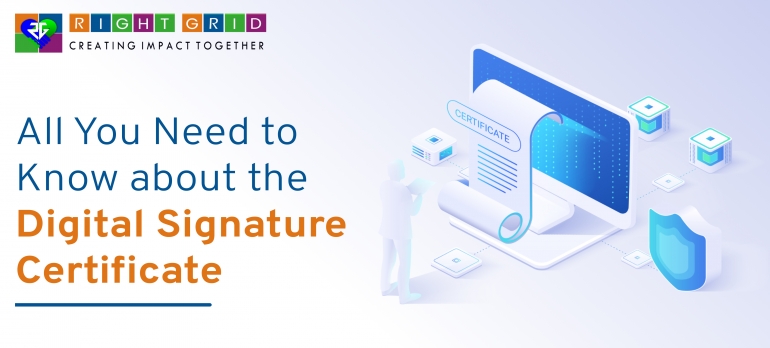
All You Need to Know about the Digital Signature Certificate
In today's digital age, where most of our transactions and communications take place online, security and authenticity have become paramount. This is where Digital Signature Certificates (DSC) come into play. A Digital Signature Certificate is an electronic form of identification that guarantees the authenticity of electronic documents and messages, ensuring they have not been tampered with and are from a verified source. In this comprehensive guide, we'll take you through all the essential aspects of Digital Signature Certificates.
1. What is a Digital Signature Certificate?
A Digital Signature Certificate, often abbreviated as DSC, is a digital equivalent of a handwritten signature. It is issued by a Certifying Authority (CA) and serves as an electronic proof of the identity of an individual or an organization. DSCs use asymmetric cryptography to create a unique key pair - a private key that remains confidential and a public key that can be shared with others to verify the authenticity of signed documents.
2. How does a Digital Signature Certificate work?
When you sign a document or a message using your DSC, the attached public key encrypts the signature. The recipient can then use the corresponding private key, which is available in the public domain, to decrypt and verify the signature. If the decryption process is successful, it confirms that the document originated from you and has not been altered during transmission.
3. Types of Digital Signature Certificates:
There are primarily three types of Digital Signature Certificates:
Class 1:
This type is issued to individuals and is mainly used for email communication and verification.
Class 2:
Suitable for individuals and entities for various online transactions, including filing tax returns and company filings.
Class 3:
The highest level of DSC, primarily used for e-commerce applications and sensitive transactions.
4. Benefits of Digital Signature Certificates:
Security:
DSCs ensure the integrity and authenticity of electronic documents, reducing the risk of fraud and unauthorized access.
Time and Cost Savings:
By eliminating the need for physical signatures and paperwork, DSCs streamline processes and save time and money.
Legal Validity:
In many countries, including India, Digital Signature Certificates hold legal validity, making them equivalent to physical signatures.
Environmental Impact:
By promoting paperless transactions, DSCs contribute to a greener environment and reduce paper waste.
5. Where to use Digital Signature Certificates?
Government Applications:
DSCs are extensively used for filing taxes, applying for government tenders, and accessing various government portals.
Financial Transactions:
In the financial sector, DSCs are used for online banking, mutual fund investments, and other financial transactions.
Business and E-commerce:
DSCs play a vital role in online business transactions, digital contracts, and e-commerce platforms.
Legal Documents:
Many legal processes, such as e-filing of court documents, require the use of Digital Signature Certificates.
6. How to Obtain a Digital Signature Certificate?
To get a DSC, you must approach a Certifying Authority authorized by the government. The process involves submitting necessary documents for identity verification. Once verified, the CA will issue the DSC in the form of a USB token or a software file that can be stored securely on your device.
Conclusion:
Digital Signature Certificates have revolutionized the way we conduct business and transactions in the digital realm. With their enhanced security features and legal validity, DSCs offer peace of mind, enabling us to embrace the convenience of paperless communication without compromising on authenticity. Whether you're an individual, a business owner, or a government entity, adopting Digital Signature Certificates is a smart step towards a safer and more efficient digital landscape.
